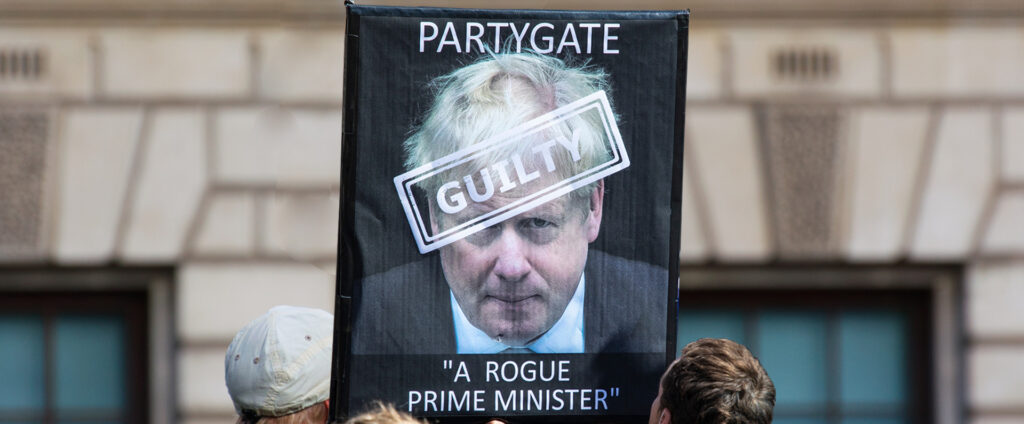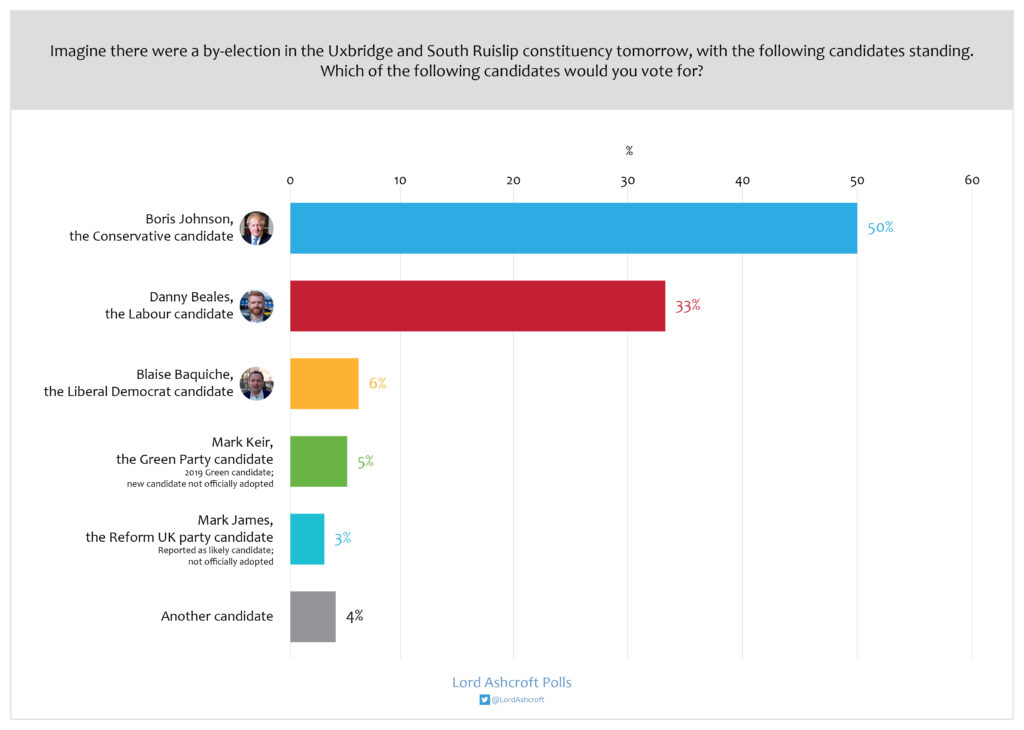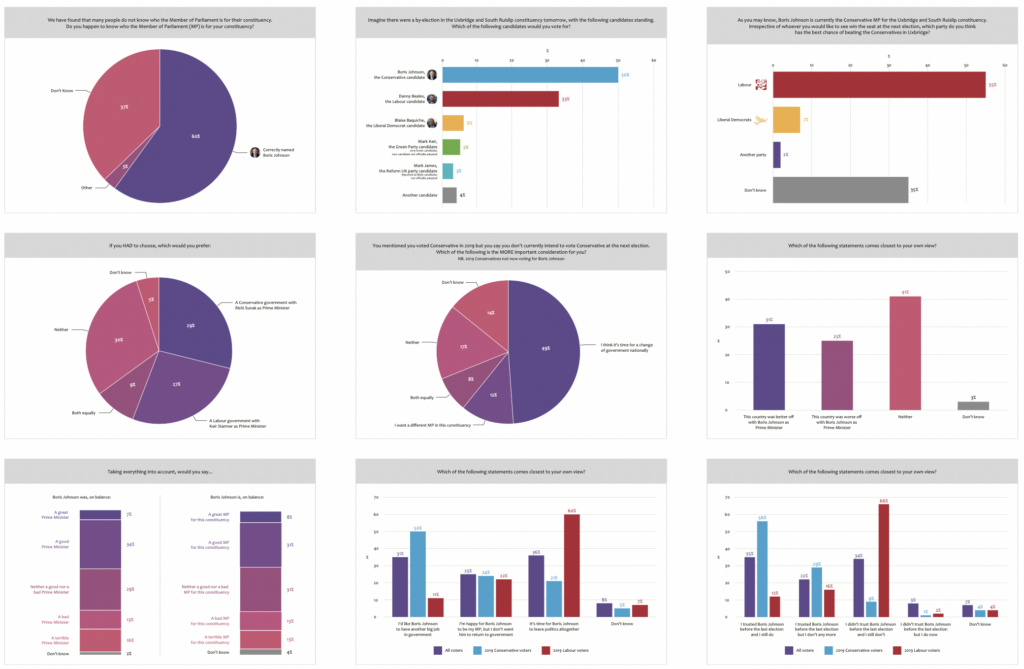
The Commons Privileges Committee is expected to publish its conclusions on whether Boris Johnson misled parliament over the partygate affair in the early summer. Depending on its findings, the Committee could recommend Johnson’s suspension from parliament, which could, if approved by the House of Commons, lead to a recall motion and a by-election in his constituency – culminating, his detractors assume, in an ignominious defeat and the end of his political career.
My latest poll suggests they shouldn’t be so sure. Our survey of the Uxbridge & South Ruislip seat completed on Friday suggests he would win a by-election tomorrow with 50% of the vote, with Labour’s Danny Beales on 33% and Liberal Democrat Blaise Baquiche a distant third on 6%, a single point ahead of the Greens.
Sceptics will make several points about this result, all of them valid. One is that constituency polls have rather a mixed history. Another is that projections based on detailed national trends have suggested that the seat is Labour’s for the taking. A third is that the voters of Uxbridge have not yet heard the Committee’s findings, which could contain some shattering further revelation – or that devastating Johnsonian WhatsApp messages might find their way into the public domain en route to the covid inquiry. A fourth is that a big-name minor-party candidate might change the game locally (for polling purposes, in the absence of an official Green contender we used the name of their 2019 candidate, and named the potential Reform UK candidate mentioned in some news reports but not officially adopted). And who knows what else might happen in Boris World before any by-election comes to pass, if it does.
But there are good reasons to accept the picture at face value. We know that Johnson is able to command extraordinary affection and loyalty. During the 2008 Henley by-election campaign, when I oversaw Conservative Party’s internal polling, one of our early concerns was that local voters might take umbrage at Johnson’s decision to leave them for his tilt at the London mayoralty – but not a bit of it. We had never come across such a popular MP and his soon-to-be former constituents wished their local hero nothing but success. That was in a very different era, of course – but 15 years later in Uxbridge, could it be that the more is thrown at Johnson, the more his voters want to rally round? If it really is true that Johnson is looking for a safer seat for 2024, maybe the task is not as urgent as he feared.
In other results, I found Uxbridge voters more likely to say Johnson was a good or great MP for the constituency (39% – including 62% of his 2019 voters and 18% of Labour’s) than a bad or terrible one (26%). His staunch and vocal opposition to a third runway at Heathrow may have had a part to play here. By similar margins, his constituents were more likely to think he had been a good or great prime minister (41%) than a bad or terrible one (29%). They were slightly more likely to say the country had been better off with Johnson as PM (31%) than worse off (25%).
Even so, only half of those who voted for Johnson at the 2019 election (and 31% overall) said they would like to see him with another big job in government. Just under a quarter (24%) of 2019 Tories said they were happy for him to remain as their MP, but didn’t want to see him back in government. 21% of them – and 36% of his constituents overall – said it was time for him to leave politics altogether.
More than half (56%) of 2019 Uxbridge Tories said they trusted Johnson before the last election, and they still do (and a further 9% said they didn’t trust him even when they voted for him, and still don’t). Just under 3 in 10 (29%) of his 2019 voters said they trusted him before the last election but don’t anymore.
Looking at the bigger picture, Uxbridge voters were quite evenly divided as to whether they would prefer a Conservative government with Rishi Sunak as prime minister (29%) or a Labour government led by Keir Starmer (27%); they were more likely to say they wanted neither (30%). Among 2019 Conservatives saying they would vote for a non-Johnson candidate, nearly half (49%) said this was because they wanted a change of government nationally; only 12% said it was because they wanted a different MP in their constituency.
Looking to the prospect of tactical voting, we found 55% saying they thought Labour had the best chance of beating the Conservatives in Uxbridge (irrespective of who they would actually like to win); 7% thought the Lib Dems were best placed, and more than a third (35%) said they didn’t know.
One other notable result is that (only?) 60% of our respondents in Uxbridge & South Ruislip knew unprompted who their MP was. If those of us in the political world are surprised by that, perhaps it says more about us than it does about the voters.
936 adults in the Uxbridge & South Ruislip constituency were interviewed by telephone between 18 May and 2 June 2023.




